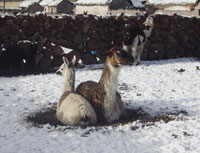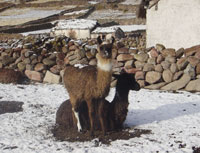WEAVING HUTS AND EQUIPMENT
FOR LIVICHUCO COMMUNITY, ORURO, BOLIVIA.
Still wider influences
The greater provision of space and facilities for the APSU members allowed them to expand their activities and improve the quality of their work. They soon had sales outlets in many cities in Bolivia, and became integrated into the networks of Fair trade and others which introduced them to exportation standards.
 As these improvements gathered pace, new demands emerged to improve prime materials, above all camelid and sheep fibre, and to combine weaving with tourist routes and potential clients that appreciated their work. Preliminary initiatives in ecoturism were developed in coordination with Wiñay Tours, based in Oruro, using the weaving huts as shelters for visits of about three tourist groups a year. However, a more concerted strategic planning initiative was needed to develop the many facets of tourism and textiles.
As these improvements gathered pace, new demands emerged to improve prime materials, above all camelid and sheep fibre, and to combine weaving with tourist routes and potential clients that appreciated their work. Preliminary initiatives in ecoturism were developed in coordination with Wiñay Tours, based in Oruro, using the weaving huts as shelters for visits of about three tourist groups a year. However, a more concerted strategic planning initiative was needed to develop the many facets of tourism and textiles.
This possibility was developed during a pre-project series of workshops in the region, organised by ILCA, based in different venues, around the market town of Challapata. In this way, the Infotambo project was launched, the idea being to rescue the cultural memory of Andean “tambos” as places of interchange and sales, but now linked by new technologies to wider contacts and improve sales outlets.
Currently, the Infotambo project in its preliminary phase of development, will build a regional centre located in Challapata market town planned for the end of 2008. Within the scope of this project, the APSU members, together with other weaving associations such as APTNAQ in the same ayllu, plan to improve the quality of prime materials, spinning, colour processing, and weaving.
 With alliances to ILCA, and to the local universities of UTO, Oruro, and the Universidad Mayor de San Andrés in La Paz, these farming organisations are looking for students of Biology and other disciplines to help them examine the existing condition of the herds, and see how they can improve fleece quality. Overseas volunteers are also welcome.
With alliances to ILCA, and to the local universities of UTO, Oruro, and the Universidad Mayor de San Andrés in La Paz, these farming organisations are looking for students of Biology and other disciplines to help them examine the existing condition of the herds, and see how they can improve fleece quality. Overseas volunteers are also welcome.
 One immediate project is to experiment with llama stables, under an agronomist’s supervision, to see if these constructions help diminish the high morality rate of young animals with respiratory diseases, which can be as high as 35% in cold spells, while promoting greater warmth at night and so more fleece growth.
One immediate project is to experiment with llama stables, under an agronomist’s supervision, to see if these constructions help diminish the high morality rate of young animals with respiratory diseases, which can be as high as 35% in cold spells, while promoting greater warmth at night and so more fleece growth.
Perhaps the members of other Rotary clubs in the world might consider these different facets of the Infotambo project as meriting consideration in their financial planning.
Fax: La Paz (00 591 2) 2 419661 - Correo Electrónico: ilcanet@ilcanet.org

